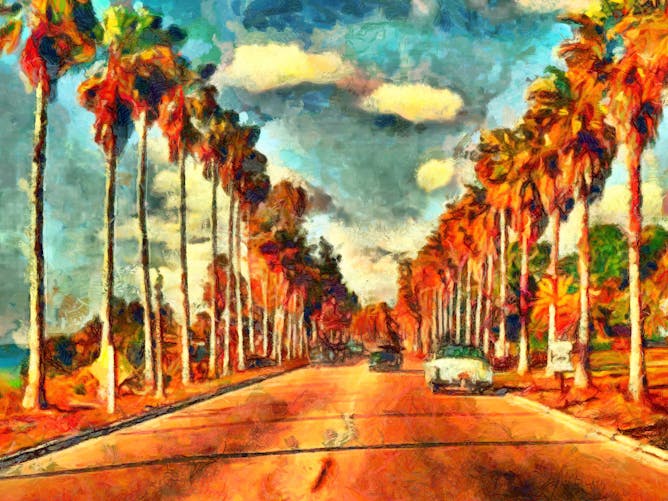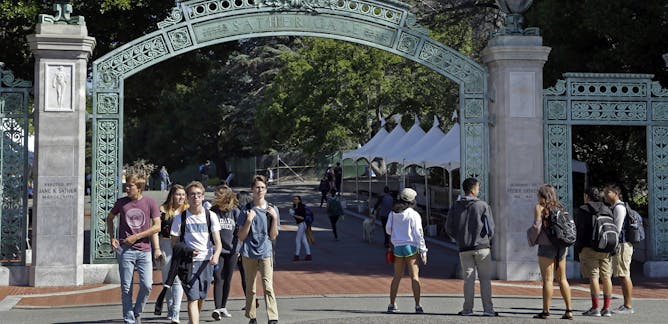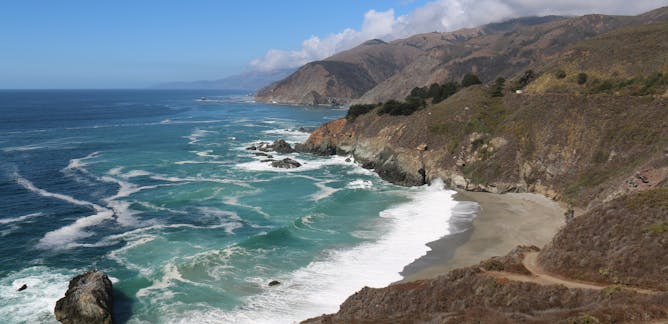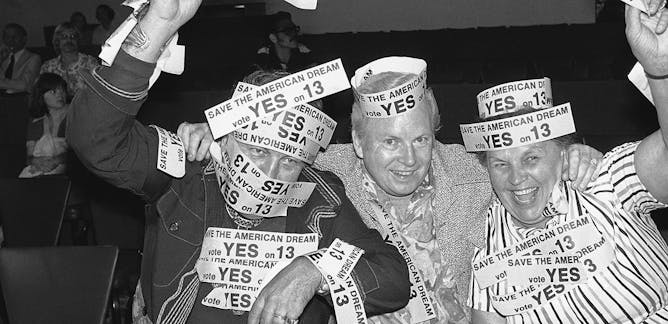| |
|
|
|
|
|
|
| |
|
Editor's note
|
|
With its Gold Rush, movie stars, blue skies and plentiful jobs, the state of California has long been a place of dreams and new beginnings.
This week, in collaboration with the public broadcaster KQED, we launch an ongoing series about the California dream – yesterday, today and tomorrow.
William Deverell, a historian of the American West, at USC Dornsife starts us off with an introduction to an intellectual pilgrimage sparked from a deceptively simple query: What is the meaning of the “California Dream” through time?
Social historian and former UC Berkeley grad student John Thelin tells the story of how excellent education for all was once at the heart of that dream. UC Santa Cruz’s Gary Griggs and Charles Lester look at the success California has had in preserving the state’s 1,100 miles of rugged coastline – and the challenges climate change now brings.
For USC Dornsife sociologist Manuel Pastor the question is how much of the California dream has been been undermined by Prop 13, the controversial tax cuts backed by a majority of the state’s voters in 1978. Today, he argues, “the state is pushing against the national grain by protecting immigrants, tackling climate change and raising the minimum wage. And most significantly for the legacy of Proposition 13, more residents are coming to see how replenishing the state's coffers is key to restoring prosperity.”
Look out for more on the California dream in the weeks ahead – and tell us what aspects of the dream you’d be interested in hearing about.
|
|
|
Top story
|

Is the California Dream still alive and well?
Ivan Aleshin/shutterstock.com
William Deverell, University of Southern California – Dornsife College of Letters, Arts and Sciences
Millions of people have imagined California, but only one man was its historian.
|
California Dreaming
|

John R. Thelin, University of Kentucky
California dream of higher education combined access to higher education with affordability and choice. Berkeley became one of the top universities in America. What happened to that dream?
| |

Gary Griggs, University of California, Santa Cruz; Charles Lester, University of California, Santa Cruz
For 50 years California has used laws and policies to manage development along its 1,100-mile coastline and preserve public access to the shore. Climate change will make that task harder.
|

Amanda Tewes, University of Massachusetts Amherst
Knott's Berry Farm and others romanticize the state's past and influence visitors’ sense of history. But their ideology reflects mid-20th-century political conservatism more than settlers' reality.
| |

Manuel Pastor, University of Southern California – Dornsife College of Letters, Arts and Sciences
In 1978, Californians voted to pass Proposition 13, which slashed property taxes and ushered in an era of underinvestment, ending the 'California dream' for many.
|
|
|
Environment + Energy
|
-
Junfeng Jiao, University of Texas at Austin; Juan Miró, University of Texas at Austin; Nicole McGrath, University of Texas at Austin
Millions of Americans rely on public transit to get to school, work or stores, but many can't get the service they need. 'Uberizing' transit by offering more options on demand could fill the gaps.
|
|
Health + Medicine
|
-
Karuna Mittal, Georgia State University; Padmashree Rida, Georgia State University; Ritu Aneja, Georgia State University
Breast cancer awareness month may be over, but don't put away your pink. The disease is with us year-round. While researchers have found several ways to treat it, here are some things to know.
|
|
Economy + Business
|
-
Michael Krassa, University of Illinois at Urbana-Champaign; Benjamin Radcliff, University of Notre Dame
The Republican tax plan would ultimately make the current system less progressive while reducing the overall burden, two things research shows make countries less happy.
-
Anthony T. Bryan, The University of the West Indies: St. Augustine Campus
Guyana is on the verge of an oil bonanza that could bring in US$1 million a day. But if it's not careful, this poor nation – population 750,000 – could fall prey to the dreaded 'resource curse.'
|
|
Science + Technology
|
-
Ian Haydon, University of Washington
By exploiting the way yeast cells mate, researchers have figured out a quicker, easier way to identify on- and off-target drug interactions.
-
Susan Landau, Tufts University
The FBI and police officials say they need to decrypt secure communications to fight crime. But they have other options, and modern threats make clear the importance of strong encryption.
|
|
Education
|
-
Rick Eckstein, Villanova University
If we think about universities as corporations and their sports teams as marketing tools, everything about the UNC academic scandal – and the nonresponse – makes perfect sense.
|
|
Trending on site
|
-
Katharine H.S. Moon, Wellesley College
Politicians and pundits are overplaying China's influence over Kim Jong-Un.
-
Dan Romer, University of Pennsylvania
In recent years, the notion of a structurally imbalanced teenage brain has been faulted for bad choices. A review of studies suggests that a deficit in brain development is not to blame.
-
Regina Hansen, Boston University
Everything you need to know about the history of Halloween.
|
|
| |
| |
| |
| |
| |
| |
|
|
|
|
|
|
| |